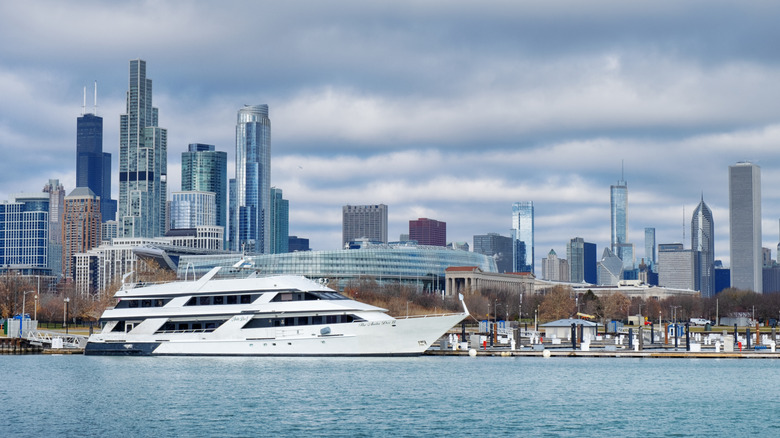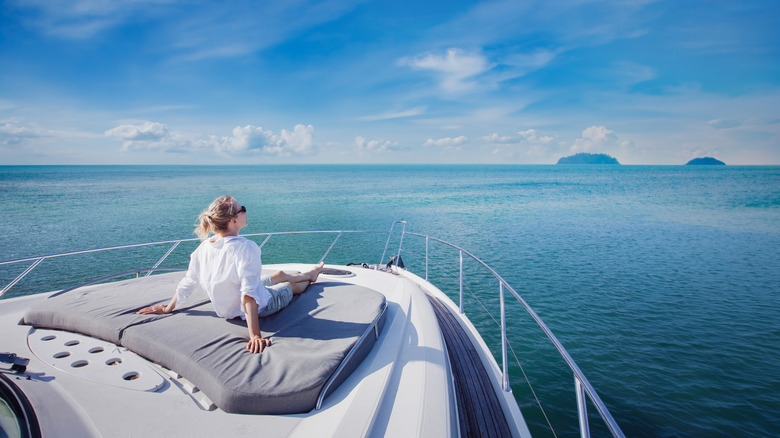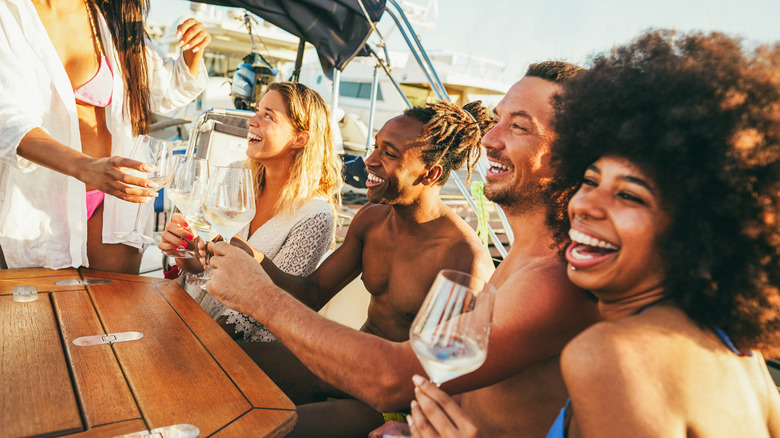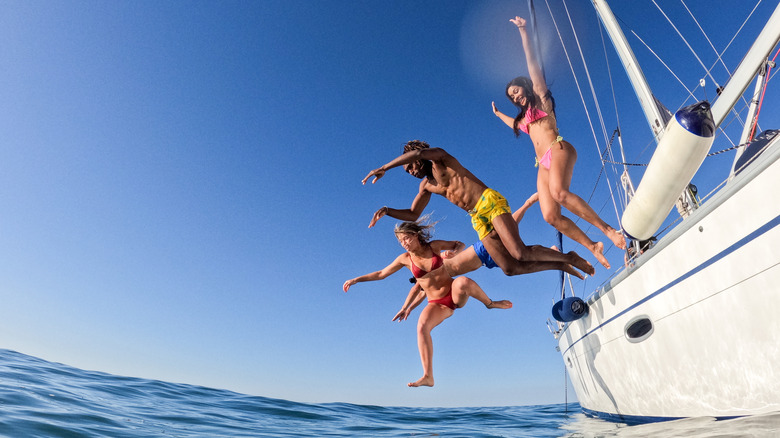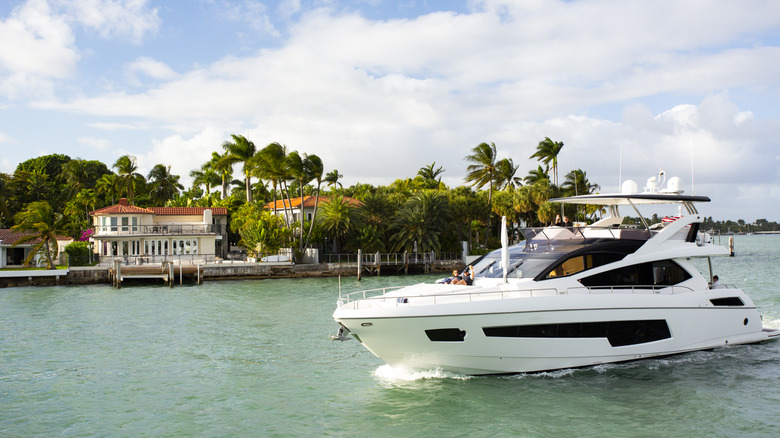The Unexpected Luxury Travel Experience Midwesterners Splurge The Most On
Midwest luxury? You're probably thinking a suite at a Bears (okay, or a Packers) game, glistening-plump ears of sweet corn, a suburban McMansion, top-of-the-line tractor-mowers, a MasterCraft ProStar with a waterski tow bar, or a top-tier fishing kit. What probably doesn't come to mind when you associate luxury with the Midwest is a yacht. Not the pontoon party barge or the vintage fishing trawler, but the real-deal, champagne-on-deck, teak-and-polish, Miami-marina kind. Yachting feels like the domain of coastal elites — the sort who dock in South Beach, summer in the Hamptons, or drift off to idylls like Sanary-sur-Mer on the sunny French Riviera. Yet according to a 2025 study by Navigore Yachting, the Flyover States are quietly harboring a love for luxury at sea.
Analyzing five years of Google search engine data across the 50 states starting in October 2020, the study categorized results into five forms of opulence: Michelin-starred restaurants, wellness retreats, luxury villas, luxury train rides, and yacht charters. States like California and New York preferred Michelin-starred dining, whereas Vermont and Montana claimed wellness retreats. Surprisingly, yacht charters came out on top in 36 states, particularly across the South and Midwest, including Indiana, Iowa, Wisconsin, Michigan, Missouri, Kansas, and Ohio (Mississippi, not considered a Midwest state, had over 50% of its luxury searches related to yacht charters). Neither luxury villas nor trains ranked at all — and perhaps with the devalued and uncomfortable state of train travel in the U.S., that last one makes sense.
It's also somewhat surprising that Illinois didn't rank for yacht charter searches. Chicago has its own boating culture, plus it's a Midwest hub for luxury charters and Great Lakes cruise lines like Victory, which offers architecturally focused itineraries throughout the Midwest. Yet according to data, the Land of Lincoln prefers its fine dining.
Yachts are aspirational
Yachts have always been associated with the super-rich — be it celebrities, villains, or both. Paparazzi photos seen around the world have captured stars on vacation for decades, and public figures from silver screen divas Elizabeth Taylor and Richard Burton, to Wolf of Wall Street himself Leonardo DiCaprio with a star-studded guest list, to pop star Selena Gomez and her bachelorette party crew, to the popular "Below Deck" franchise on Bravo — have encapsulated "lifestyles of the rich and famous" on all manner of luxury watercraft.
There are a few reasons for this: Yachts provide private spaces away from the public eye (minus the occasional aforementioned paparazzi); they provide access to remote destinations ideal for an exhilirating vacation, passengers can customize their own itineraries; and they're just plain fun to be on, offering kitchens, water sports toys, interior air conditioning, and a comfortable, private bubble in which to navigate the world.
Boats are also expensive, inspiring generations of classic jokes like, "B.O.A.T: Bring Out Another Thousand" or defining "boat" as "a hole in the water into which one throws money." Yes, boats are pricey, and yachts are the most expensive of them all. "Yacht" defines a wide range of models, sizes, and designs — generally at least 26 feet long and surpassing the 290-foot-or-more gigayacht, "the most expensive item that our species has figured out how to own," as a New Yorker article quipped. But there's one thing most yachts have in common — the expenses don't stop with the purchase of the ship itself. Slip space, marina fees, staff, and fuel — to say the least — all make this an exclusive hobby traditionally reserved for the elite. For many, yachts function less as attainable purchases and more as symbols of escape, freedom, and luxury living.
Charters make yachts and luxury more accessible
A yacht charter allows individuals or groups to set sail for a finite amount of time for any number of reasons: leisure, vacation, special events, corporate outings, and more. Much like you can rent Airbnbs for exclusive design or unique access, a yacht charter offers a temporary taste of the luxury lifestyle. It doesn't have to be the 108-foot superyacht Sunseeker Predator à la "Casino Royale," — even James Bond's smaller, 54-foot monohull from the same movie qualifies as a yacht. They can range from modest sailing yachts and catamarans to high-end motorcraft decked out in premium amenities. Often, there's an on-board crew member or service staffer who assists the captain, pours drinks, serves food, and ensures hospitality is at its finest.
While purchasing a yacht might be out of reach for Americans who aren't Jeff Bezos, an increasing number can, theoretically, ride on one. According to recent market research reports, the flexibility offered by digital booking platforms and mobile apps, technological innovations in yacht construction, and improved management practices are making yacht life accessible to a new generation — and a broader socioeconomic class.
While you can fly to Europe and charter one in the Mediterranean or the Balkans, yacht charters are increasingly popular in coastal U.S. spots like Los Angeles and Miami, where you can book an afternoon on a 55-foot Azimut flybridge to throw a birthday party in Biscayne Bay, or charter a vessel all the way to the Bahamas at just a fraction of the cost of ownership. For aspirational yachters in states like Kansas or Indiana, you don't even have to travel as far as Miami — look to the Great Lakes, where you can charter a yacht without even leaving the region.
Consumers are increasingly seeking experiences over goods
There's a rising demand for luxury tourism, such as yacht charters and custom vacations, driving the market in recent years, not only in the Midwest. Spending habits, disposable income, and lifestyle changes, particularly post-pandemic, have shifted toward experience-based costs, and tourism has only grown, as demonstrated by numerous market studies. According to The World Travel & Tourism Council, travel and tourism is projected to account for 10% of dollars spent globally, and the yacht charter industry is rising to meet demand for personalized experiences within that sector.
These movements also reflect broader Millennial and Gen-Z trends that prioritize memories over possessions — spending money on indulgent experiences rather than material goods – as the new measure of luxury. Social media platforms are normalizing all of this while making it seem attainable — even to those in landlocked states. The rise of sustainable tourism and clean-energy yachts is also influencing the industry. While this is ostensibly led by luxury travelers (often referred to as HNWIs, or high-net-worth individuals), the demand is also driven by Gen-Z and Millennial consumers, who statistically prioritize sustainability in their purchasing decisions. There's also a growing number of young HNWIs globally looking to spend their disposable income on yacht experiences.
From 2024 to 2025 alone, the compound growth rate of the luxury yacht market grew 6.5%, from $16.27 billion to $17.33 billion (via Business Herald), and research shows that travelers are increasingly choosing yachts over traditional resorts and vacation packages. Extended charters are also seen as viable for workers thanks to the rise of remote jobs, a trend that has increased since 2020. Additionally, as the yacht industry seeks to expand, it's pushing into new, emerging markets, such as Asia, Southeast Asia, and the Middle East, offering more year-round options.
Growing Midwestern wealth pockets might explain the rise in yacht charter searches
Growing wealth pockets in some Midwest states ranked yacht charters at the top of their luxury searches, and although that doesn't correlate with increased yacht sales, it's interesting to see how it may reflect socioeconomic growth. Midwestern metro areas, including Grand Rapids, Michigan, Kansas City, Kansas, Green Bay, Wisconsin, Evansville, Indiana, and Davenport, Iowa — one of the best and most affordable Mississippi River cities for retirees — are all experiencing an upper-middle-class ($100,000 to $149,000 annual household income) boom, though reportedly at a steadier rate than some coastal cities. If yachts are an idealists' encapsulation of luxury, it makes sense that areas experiencing prosperity might be looking for ways to utilize that disposable income. But why didn't all the Midwest states appear on that Navigore Yachting list?
The Great Lakes region of the Midwest already prides itself on its boating culture, and both Great Lakes Midwestern states — Illinois, with Chicago's aforementioned boating access — and Minnesota, aka the "land of 1,000 lakes" — prefer Michelin-starred restaurant searches rather than yachts. So did Massachusetts — which, while not a Midwest state, does lay claim to Cape Cod, both of which have historically been associated with maritime life and sailboating. (Other Eastern seaboard states like Maryland and Maine ended up on the yacht charter list, however.) Since boats are more ingrained in these cultures, it could be inferred that it's culturally not as aspirational to charter yachts for leisure.
From Navigore Yachting's study, it's clear that there's a potential untapped market for luxury travel with Midwestern audiences, and savvy brands may start tapping into destination experiences or complete trip-and-charter packages to translate that search engine interest into sales and engagement.
